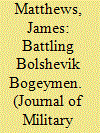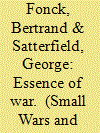| Srl | Item |
| 1 |
ID:
146806


|
|
|
|
|
| Contents |
By placing the anti-Bolshevik reaction in Spain in 1917-1923 in a transnational context, this article adds nuance to a Europe-wide analysis of the era’s counter-revolutionary movements by including a prominent First World War neutral. It also questions the prominent “brutalization” thesis that links postwar violence to trench warfare and military defeat. This cannot explain the widespread and violent social unrest that gripped Spain after 1917. But, rather than reject the war and brutalization thesis entirely, this article contends that the Russian Revolution should be seen as part of a “Greater War” that affected all countries, whether they were formally belligerents or not.
|
|
|
|
|
|
|
|
|
|
|
|
|
|
|
|
| 2 |
ID:
133512


|
|
|
|
|
| Publication |
2014.
|
| Summary/Abstract |
In the late seventeenth century during the Dutch War (1672-1678) and the Nine Years War (1688-1697), French armies relied on small war for the accomplishment of essential tasks and as part of an overall strategy of exhausting their opponents in the Low Countries. The purposes of small war included the imposition of contributions on enemy populations, the destruction of the enemy base of operations, blockades of fortresses, and the general support of campaign armies. The expression 'small war' in the French language appeared with growing frequency in the 1690s. Small war can be viewed as both a cause and consequence of the characteristics of these wars. The limited policy goals of Louis XIV the king of France required a strategy that minimised risk and accomplished the goal of reducing if not eliminating the Spanish presence in the Low Countries that bordered the north of France. As French armies increased in size during this period, the demand for specialists at small increased in order to provide security and ensure supply. Small war in the late seventeenth century was thus not ideologically motivated insurgency, but in the minds of French commanders an essential component of strategy and the nature of war.
|
|
|
|
|
|
|
|
|
|
|
|
|
|
|
|